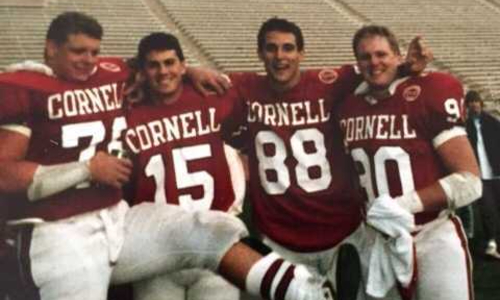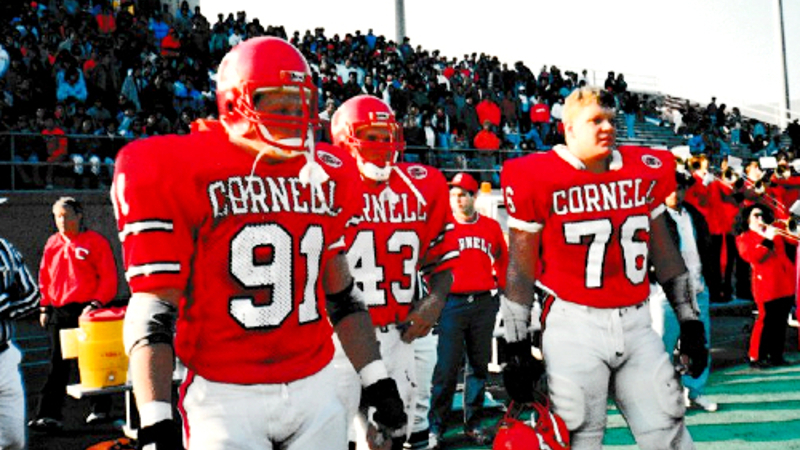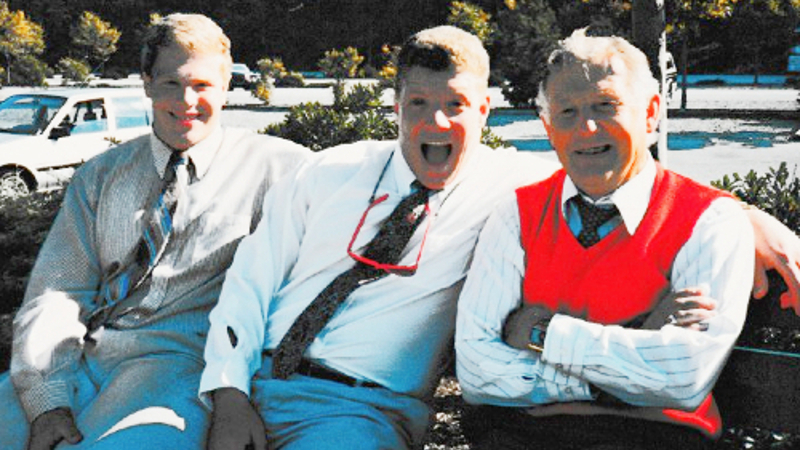Legacy Stories
Leo Reherman
Lee Reherman (called “Leo” by his friends) was a star offensive lineman for Cornell University before achieving global fame as “Hawk” on the hit TV series “American Gladiators”. In addition to Gladiators, Leo was a successful host, and producer for television shows like “The X-Files”, “NCIS”, “Chuck”, “General Hospital”, and “Hot Rod TV”. He passed unexpectedly in 2016 due to a cardiovascular event at the young age of 49. Researchers at the VA-BU-CLF Brain Bank later diagnosed Leo with Stage 2 (of 4) Chronic Traumatic Encephalopathy (CTE). Now, five years after his tragic death, the Reherman family hopes his story will highlight the importance of CLF’s Flag Football Under 14 campaign.

Leo was born in Louisville, Kentucky on the 4th of July in 1966. He went on to star for Saint Agnes Grade School and Saint Xavier High School, both in Louisville. His academic and athletic success led him to Cornell University.

Wearing number 76, Leo thrived as an offensive lineman for the Big Red from ’85-’88. He was a co-captain of the team his senior year and earned All-Ivy League distinction twice. He tried out for the Miami Dolphins after graduation, but decided to retire from football and head to UCLA’s Anderson School of Management, where he received his MBA.
Leo picked up acting while in Los Angeles and scored his big break in 1993 when he earned the role of “Hawk” on TV’s “American Gladiators.” He played “Hawk” through the show’s finale in 1996. Over the next 20 years, he built out an impressive IMDB page of acting, producing, and hosting credits for hit shows such as “Gilmore Girls”, “The X-Files”, “The Shield”, “NCIS”, “Prison Break”, “General Hospital”, and the hit motion picture, “Downhill Willie.” While there was talk of Leo receiving an Oscar nomination for his portrayal of Hans Saxer in “Downhill Willie”, he was unfortunately snubbed by the Academy.
In his mid-40’s, Leo started expressing to his family and friends his issues with memory, depression, irritability, and overall frustration with his declining health. He told loved ones he wished for his brain to be donated to the VA-BU-CLF Brain Bank upon his death, as he thought he may have CTE. Leo was very familiar with CTE due to the loss of his friend and Cornell teammate Tom McHale, and his friendship with Lisa McHale, Tom’s wife.
Leo was found dead at his home on February 29, 2016, just a few months shy of his 50th birthday. His family fulfilled his wish and sent his brain to the Brain Bank for research. There, researchers diagnosed him with Stage 2 (of 2) CTE.
CTE has affected many of Leo’s former teammates, opponents, and professional colleagues.
As noted, Leo was teammates with Tom McHale, a former All-American defensive lineman for Cornell, who played nine years in the NFL. McHale died in 2008 at age 45 and was the second former NFL player to be diagnosed with CTE by researchers at the VA-BU-CLF Brain Bank. “American Gladiators” was hosted by former NFL player Mike Adamle. In 2017, Adamle went public with his diagnosis of dementia, likely due to CTE.
Leo began playing tackle football at the age of 10. In May 2018, Brain Bank scientists published in Annals of Neurology that among 211 football players diagnosed with CTE, those who began playing tackle football before age 12 had an earlier onset of symptoms by an average of 13 years, independent of concussion history.
CLF launched its Flag Football Under 14 campaign in early 2018 to educate parents on the effects of youth tackle football and to advocate children under 14 play flag football. Lee Reherman Sr., who played college football at Notre Dame, wholeheartedly agrees.
“CTE is not just an issue affecting professional football players,” said Reherman Sr. in 2018. “We hope that by announcing Lee’s diagnosis, we can drive more awareness of the need for CTE research at all levels, and encourage parents to delay enrolling their children in tackle football until high school."

Several former Cornell alumni and friends are representing Leo Reherman, Tom McHale, and Dave Van Metre, three former Cornellians affected by CTE, by participating in the 2021 Virtual Cleveland Marathon. Please consider a donation to Team Cornell as they support CLF’s efforts to create a world without CTE here.
You May Also Like

Living with suspected CTE can be difficult, but CTE is not a death sentence and it is important to maintain hope. Find out how.
Living with CTE
Although we cannot yet accurately diagnose CTE in living people, a specialist can help treat the symptoms presenting the most challenges.
CTE Treatments